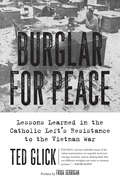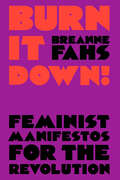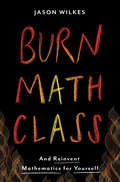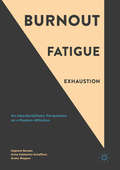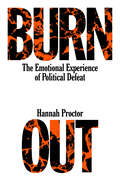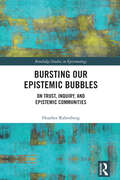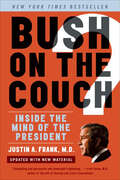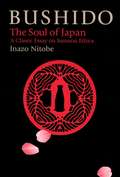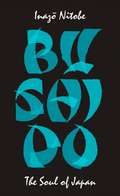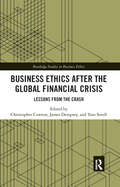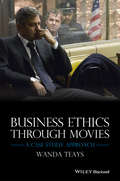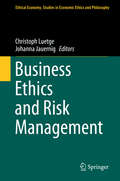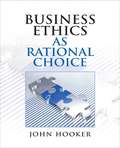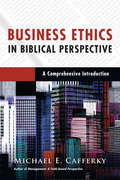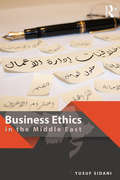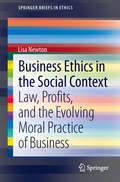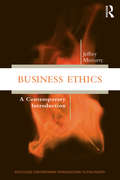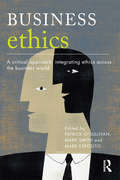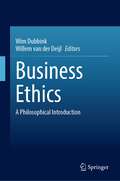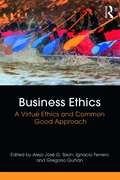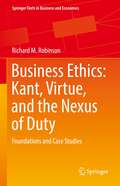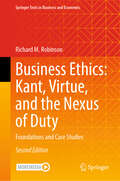- Table View
- List View
Burglar for Peace: Lessons Learned in the Catholic Left's Resistance to the Vietnam War
by Ted GlickBurglar for Peace is the incredible story of the Catholic Left—also known as the Ultra Resistance—from the late 1960's to the early '70's. Led by the Catholic priests Phil and Dan Berrigan, the Catholic Left quickly became one of the most important sectors of the Vietnam War-era peace movement after a nonviolent raid on a draft board in Catonsville, MD, in May 1968. With an overview of the broader draft resistance movement, Burglar for Peace is an exploration of the sweeping landscape of the American Left during the Vietnam War era as we accompany Ted Glick on a journey through his personal evolution from typical, white, middle-class, American teenager to an antiwar, nonviolent draft resister. Glick vividly recounts the development of the Catholic Left as it organized scores of nonviolently disruptive, effective actions inside draft boards, FBI offices, war corporation offices, and other sites. Burglar for Peace is the first in-depth, inside look at one of the major political trials of Catholic Left activists, in Rochester, NY in 1970, as well as a second one in 1972 in Harrisburg, PA. With great humility, Glick recalls how his selfless devotion to ending the war in Vietnam resulted in his eleven months of imprisonment, which included a thirty-four-day hunger strike, and he tells the remarkable story of a Catholic Left-organized, forty-day hunger strike against the war. Concluding the story is a reflective account of Glick's open resignation from the Catholic Left in 1974, his eighteen-year estrangement from Phil and Dan Berrigan, and the eventual healing of that relationship. The final chapter relates timeless lessons learned by the author that will find deep resonance among activists today.
Burn It Down!: Feminist Manifestos for the Revolution
by Breanne FahsThe most comprehensive collection of feminist manifestos, chronicling our rage and dreams from the nineteenth century to todayIn this landmark collection spanning three centuries and four waves of feminist activism and writing, Burn It Down! is a testament to what is possible when women are driven to the edge. <P><P>The manifesto—raging and wanting, quarreling and provoking—has always played a central role in feminism, and it’s the angry, brash feminism we need now. Collecting over seventy-five manifestos from around the world, Burn It Down! is a rallying cry and a call to action. <P><P>Breanne Fahs argues that we need manifestos in all their urgent rawness—their insistence that we have to act now, that we must face this, that the bleeding edge of rage and defiance ignites new and revolutionary possibilities is where new ideas are born.
Burn Math Class: And Reinvent Mathematics for Yourself
by Jason WilkesForget everything you've been taught about math. In Burn Math Class, Jason Wilkes takes the traditional approach to mathematics education-with its unwelcoming textbooks, unexplained rules, and authoritarian assertions-and sets it on fire.Focusing on how mathematics is created rather than on mathematical facts, Wilkes teaches the subject in a way that requires no memorization and no prior knowledge beyond addition and multiplication. From these simple foundations, Burn Math Class shows how mathematics can be (re)invented from scratch without preexisting textbooks and courses. We can discover math on our own through experimentation and failure, without appealing to any outside authority. When math is created free from arcane notations and pretentious jargon that hide the simplicity of mathematical concepts, it can be understood organically-and it becomes fun!Following this unconventional approach, Burn Math Class leads the reader from the basics of elementary arithmetic to various "advanced" topics, such as time-dilation in special relativity, Taylor series, and calculus in infinite-dimensional spaces. Along the way, Wilkes argues that orthodox mathematics education has been teaching the subject backward: calculus belongs before many of its so-called prerequisites, and those prerequisites cannot be fully understood without calculus.Like the smartest, craziest teacher you've ever had, Wilkes guides you on an adventure in mathematical creation that will radically change the way you think about math. Revealing the beauty and simplicity of this timeless subject, Burn Math Class turns everything that seems difficult about mathematics upside down and sideways until you understand just how easy math can be.<P><P><i>Advisory: Bookshare has learned that this book offers only partial accessibility. We have kept it in the collection because it is useful for some of our members. To explore further access options with us, please contact us through the Book Quality link on the right sidebar. Benetech is actively working on projects to improve accessibility issues such as these.</i>
Burnout, Fatigue, Exhaustion: An Interdisciplinary Perspective on a Modern Affliction
by Anna Katharina Schaffner Sighard Neckel Greta WagnerThis interdisciplinary book explores both the connections and the tensions between sociological, psychological, and biological theories of exhaustion. It examines how the prevalence of exhaustion - both as an individual experience and as a broader socio-cultural phenomenon - is manifest in the epidemic rise of burnout, depression, and chronic fatigue. It provides innovative analyses of the complex interplay between the processes involved in the production of mental health diagnoses, socio-cultural transformations, and subjective illness experiences. Using many of the existing ideologically charged exhaustion theories as case studies, the authors investigate how individual discomfort and wider social dynamics are interrelated. Covering a broad range of topics, this book will appeal to those working in the fields of psychology, sociology, medicine, psychiatry, literature, and history.
Burnout: The Emotional Experience of Political Defeat
by Hannah Proctor"Hannah Proctor takes that feeling we all have, and names it again and again, helping us to resee the past and present of revolutionary struggle. A must-read."–Hannah Zeavin, Founding Editor, Parapraxis How to maintain hope in the face of despairIn the struggle for a better world, setbacks are inevitable. Defeat can feel overwhelming at times, but it has to be endured. How then do the people on the front line keep going? To answer that question and to help readers roll with the punches, Hannah Proctor draws on historical resources to find out how revolutionaries and activists of the past kept a grip on hope.Burnout considers former Communards exiled to a penal colony in the South Pacific; a young Bolshevik fleeing the city in despair; an ex-militant on the analyst&’s couch relating dreams of ruined landscapes; a trade union organiser seeking advice from a spiritual healer; and a group of feminists padding a room with mattresses to scream about the patriarchy. Jettisoning therapy talk and its stranglehold on our language, Proctor offers a different way forward - neither denial nor despair. Her cogent exploration of the ways militants make sense of their own burnout demonstrates that it is possible to mourn and organise at once, and to do both without compromise.
Bursting Our Epistemic Bubbles: On Trust, Inquiry, and Epistemic Communities (Routledge Studies in Epistemology)
by Heather RabenbergDue in large part to the increased personalization of various aspects of the Internet, many people have become insulated from the epistemic influence of people with views different from their own. This book develops a social epistemic framework that expands our understanding of epistemic normativity such that we can get a clearer view of phenomena like epistemic bubbles and echo chambers.The book begins by arguing that as members of epistemic communities, we are subject to epistemic norms and values that cannot be realized by a single individual. Attention to these social epistemic values is crucial to getting to the core of the problems that plague our current social and political epistemic world. After laying out a thoroughly social epistemic framework, the author uses it to argue that there are epistemic norms specifically governing inquiry and trust. These two concepts have often been relegated to the practical realm rather than the epistemic. This is a mistake because understanding how we ought to trust and inquire is central to thinking about how to fix many of our social epistemic problems. The author argues that assuming we must choose between trust and inquiry is often the source of our social epistemic problems. Inquiring while trusting is a crucial epistemic balancing act, which anchors us in epistemic communities and assists us in the pursuit of knowing with others.Bursting Our Epistemic Bubbles will be of interest to scholars and advanced students working in social and political epistemology.
Bush on the Couch: Inside the Mind of the President
by Justin A. FrankWith the Bush administration in permanent crisis, a renowned Washington psychoanalyst updates his portrait of George W.'s public persona—and how it has damaged the presidency.Insightful and accessible, courageous and controversial, Bush on the Couch sheds startling new light on George W. Bush's psyche and its impact on the way he governs, tackling head-on the question few seem willing to ask: Is our president psychologically fit to run the country? With an eye for the subtleties of human behavior sharpened by thirty years of clinical practice, Dr. Justin A. Frank traces the development of Bush's character from childhood through his presidency, identifying and analyzing his patterns of thought, action, and communication. The result is a troubling portrait filled with important revelations about our nation's leader—including disturbing new insights into:How Bush reacted to the 2006 Democratic sweep in Congress with a new surge of troops into IraqHis telling habits and coping strategies—from his persistent mangling of English to his tendency to "go blank" in the midst of crisisThe tearful public breakdown of his father, George H. W. Bush, and what it says about the former president's relationship to his prominent sonsThe debacle of Katrina—the moment when Bush's arrogance finally failed himWith a new introduction and afterword, Bush on the Couch offers the most thorough and candid portrait to date of arguably the most psychologically damaged president since Nixon.
Bushido: The Soul of Japan
by Inazo NitobeChivalry is a flower no less indigenous to the soil of Japan than its emblem, the cherry blossom; nor is it a dried-up specimen of an antique virtue preserved in the herbarium of our history. It is still a living object of power and beauty among us; and if it assumes no tangible shape or form, it not the less scents the moral atmosphere, and makes us aware that we are still under its potent spell. The conditions of society which brought it forth and nourished it have long disappeared; but as those far-off stars which once were and are not, still continue to shed their rays upon us, so the light of chivalry, which was a child of feudalism, still illuminates our moral path, surviving its mother institution. It is a pleasure to me to reflect upon this subject in the language of Burke, who uttered the well-known touching eulogy over the neglected bier of its European prototype.
Bushido: The Soul of Japan
by Inazo NitobeA century ago, when Japan was transforming itself from an isolated feudal society into a modern nation, a Japanese educator queried about the ethos of his people composed this seminal work, which with his numerous other writings in English made him the best, known Japanese writer in the West during his lifetime.He found in Bushido, the Way of the Warrior, the sources of the virtues most admired by his people: rectitude, courage, benevolence, politeness, sincerity, honor, loyalty and self-control. His approach to his task was eclectic and far-reaching. On the one hand, he delved into the indigenous traditions, into Buddhism, Shintoism, Confucianism and the moral guidelines handed down over hundreds of years by Japan's samurai and sages. On the other hand, he sought similarities and contrasts by citing not only Western philosophers and statesmen, but also the shapers of European and American thought and civilization going back to the Romans, the Greeks and Biblical times.This book is a classic to which generations of scholars and laymen alike have long referred for insights into the character of the Japanese people. And all of its many readers in the past have been amply rewarded, as will be all those who turn to its pages in the next and future decades.
Bushido: The Soul of Japan (Penguin Great Ideas)
by Inazo Nitobe'What Japan was she owed to the samurai. They were not only the flower of the nation, but its root as well.'Inazo Nitobe's book, the most influential ever written on Bushido, or the samurai Way of the Warrior, argues that the philosophy of Bushido is the true key to understanding 'the soul of Japan'.One of twenty new books in the bestselling Penguin Great Ideas series. This new selection showcases a diverse list of thinkers who have helped shape our world today, from anarchists to stoics, feminists to prophets, satirists to Zen Buddhists.
Business And Education In The Middle East
by Nehme AzouryBusiness and Education in the Middle East brings together academic and business expertise in order to come up with long-term strategies that will have a great effect on the university performance and governance. The book shares experiences and knowledge to explore innovative strategies and plans with a new perspective for the future.
Business Ethics After the Global Financial Crisis: Lessons from The Crash (Routledge Studies in Business Ethics)
by Tom Sorell Christopher Cowton James DempseyThe global financial crisis (GFC) that began in 2007 concentrated attention on the morality of banking and financial activities. Just as mainstream businesses became increasingly defined by their financial performance, banks, it seemed, got themselves – and everyone else – into trouble through an over-emphasis on themselves as commercial enterprises that need pay little attention to traditional banking virtues or ethics. While the GFC had many causes, criticism was legitimately levelled at banks over the ethics of mortgage creation, excessive securitisation, executive remuneration, and high-pressure customer sales tactics, amongst other things. These criticisms mirror those that have been levelled at the business more generally, particular in the last decade, although the backdrop provided by the GFC is more dramatic, and the outcomes of supposed wrongdoing more severe. This book focuses on business ethics after the GFC; not on the crisis itself, but how we should respond to it. The GFC has focused minds on the proper role of ethics in the understanding and conduct of business activity, but it is essential to look beyond the crisis to address the deeper challenges that it highlights. The aim of this volume is to present examples of the latest philosophically-informed thinking across a range of ethical issues that relate to business activity, using the banks and the GFC – the consequences of which continue to reverberate – as a point of departure. The book will be of great value to researchers, academics, practitioners, and students interested in business, ethics in general, and business ethics in particular.
Business Ethics Through Movies
by Wanda TeaysBusiness Ethics Through Movies: A Case Study Approach examines a wide range of ethical dilemmas, principles and moral reasoning that arise in contemporary business through a series of popular films and real-world case studies. Engages readers in learning about ethical theory by using movies and both national and international case studies in business as the vehicle for analysis and reflection Facilitates comprehension of ethical issues by showing how characters in films confront issues, make choices, and face the consequences Draws from a variety of actual cases in Business Ethics - from the 1982 Tylenol poisoning and the 1989 Exxon Valdez disaster to recent examples such as the Foster Farms salmonella outbreak and the chemical spill in West Virginia Reveals the important role that ethics plays in setting the moral foundation of a business or corporation Develops critical thinking skills through applying analytical checklists to ethical dilemmas raised in films and in actual cases in Business Ethics
Business Ethics and Risk Management (Ethical Economy #43)
by Christoph Luetge Johanna JauernigThis volume explores various aspects of risk taking. It offers an analysis of financial, entrepreneurial and social risks, as well as a discussion of the ethical implications of empirical findings. The main issues examined in the book are the financial crisis and its implications for business ethics. The book discusses unethical behaviour as a reputational risk (e. g. , in the case of Goldman Sachs) and the question is raised as to what extent the financial crisis has changed the banks' entrepreneurial strategy. The book presents an analysis of the reasons leading to the crisis and identifies them as ethical dilemma structures. In addition, it looks at general questions regarding ethical behaviour and risk taking, such as: To what extent does the social embeddedness or abstraction play a role in guaranteeing ethical behaviour? What conclusions can be drawn from institutional or evolutionary perspectives on risk management? Finally, the book discusses further issues that become factors of risk within and between societies, such as work insecurity, corruption or the problem of facilitation payments as a risk in international transactions.
Business Ethics as Rational Choice
by John HookerBusiness Ethics as Rational Choice focuses on building decision-making skills so that readers can arrive at, and defend, personal or company decisions in an objective, and convincing, manner.
Business Ethics in Biblical Perspective: A Comprehensive Introduction
by Michael E. CafferkyIt is legal for CEOs to make 300 times the amount of the average worker. But is this fair and just? Is it ethical for a customer to purchase a digital camera for the sole purpose of using it on a ski trip and then return the item to the store afterwards? Should companies who purchase advertising space on websites that offer pirated videos for download be held accountable for breaking intellectual property laws? The world of business is fraught with ethical challenges. Some of these are relatively straightforward, but others are complicated and require careful reflection. While there are numerous theories to help people navigate these dilemmas, the goal of this book is to provide a comprehensive biblical perspective on contemporary issues in areas such as consumer behavior, management, accounting and marketing. In Business Ethics in Biblical Perspective, Michael E. Cafferky explores the biblical resources for moral guidance and ethical consideration. He identifies twelve key themes in the narrative of Scripture: cosmic conflict, creation, holiness, covenant relationships, shalom, sabbath, justice, righteousness, truth, wisdom, loving kindness and redemption. By looking at ethical approaches and issues through this multifaceted biblical perspective, Cafferky helps readers appreciate the complex nature of ethical decision making, particularly in the context of business and finance. Designed from the start with the classroom in mind, each chapter of Business Ethics in Biblical Perspective provides example scenarios, questions for intrapersonal and interpersonal ethical reflection, review questions, ethical vignettes for discussion and an exploration of the chapter material in light of the biblical themes. Additional IVP Instructor Resources are also available.
Business Ethics in the 21st Century (Issues in Business Ethics #39)
by Norman BowieThis work provides a critical look at business practice in the early 21st century and suggests changes that are both practical and normatively superior. Several chapters present a reflection on business ethics from a societal or macro-organizational point of view. It makes a case for the economic and moral superiority of the sustainability capitalism of the European Union over the finance-based model of the United States. Most major themes in business ethics are covered and some new ones are introduced, including the topic of the right way to teach business ethics. The general approach adopted in this volume is Kantian. Alternative approaches are critically evaluated.
Business Ethics in the Middle East
by Yusuf SidaniBusiness Ethics in the Middle East fills a crucial gap in the Middle East educational landscape. Written in an easy and accessible format, this book covers the foundations of business ethics by drawing from both Eastern and Western traditions. The chapters include many examples, case studies, activities, and illustrations that are customized to the Middle Eastern market, yet relevant to readers outside of the Middle East who want thorough insights about business behaviour in the region. A special module introduces the Arab Middle Eastern context that non-Arab readers will find valuable. The author addresses topics related to organizational culture, leadership, CSR, corporate governance, marketing, HR, accounting, finance, and production. This is accomplished with a deep attention to the cultural and contextual elements of the Middle East. Special attention is given to religious business ethics, while still deeply engaging the vast heritage of Western ethical systems. This combination is essential for the development of a comprehensive approach to the topic of business ethics. This textbook will be essential reading for students of business ethics in the Middle East and will also be valuable for students and researchers across business ethics, Islamic Studies, religion, and philosophy.
Business Ethics in the Social Context: Law, Profits, and the Evolving Moral Practice of Business (SpringerBriefs in Ethics)
by Lisa NewtonThe book tracks the rise of Business Ethics as a discipline in the United States through a review of the basic understandings of the role of business practices in the operations of society, beginning with Aristotle and proceeding to a review of the formative concepts and cases in the history of American business.
Business Ethics: A Contemporary Introduction (Routledge Contemporary Introductions to Philosophy)
by Jeffrey MoriartyPacked with examples, this book offers a clear and engaging overview of ethical issues in business. It begins with a discussion of foundational issues, including the objectivity of ethics, the content of ethical theories, and the debate between capitalism and socialism, making it suitable for the beginning student. It then examines ethical issues in business in three broad areas. The first is the market. Issues explored are what can be sold (the limits of markets) and how it can be sold (ethics in marketing). The second is work. Topics in this area are health and safety, meaningful work, compensation, hiring and firing, privacy, and whistleblowing. The third area is the firm in society. Here readers explore corporate social responsibility, corporate political activity, and the set of ethical challenges that attend international business. Issues are introduced through real-world examples that underscore their importance and make them come alive. Arguments for opposing positions are given fair hearings and students are encouraged to develop and defend their own views. Key Features Introduces each topic with a real-world example, which is referenced regularly in the subsequent argument. Contains a critical evaluation of capitalism and socialism, with a focus on private property, the market system, and the welfare state. Explores the limits of markets and encourages students to ask what should and should not be for sale. Explores the phenomena of corporate political activity and ethical consumerism. Includes initial chapter overviews and – at the end of each chapter – study questions and suggested additional readings.
Business Ethics: A Critical Approach: Integrating Ethics Across the Business World
by Mark Smith Mark Esposito Patrick O’SullivanEvents such as Trafigura's illegal dumping of toxic waste in Côte d’Ivoire and BP's environmentally disastrous oil spill in the Gulf of Mexico have highlighted ethical issues in international business at a time when business leaders, academics and business schools were reflecting on their own responsibilities following the global financial crisis. The scope and scale of the global operations of multinational businesses means that decisions taken in different parts of the world have far reaching consequences beyond the national settings where employees are located or where firms are registered and as such, an awareness of these responsibilities needs to be integrated into all levels and all subjects. Using four guiding principles – a critical multi-level approach rooted in the tradition of European social theory, a comparative and international perspective, a global rather than just a European or American stand point and engaging with subject-specific issues this book aims to 'mainstream' business ethics into the work of teachers and students in business schools. This comprehensive volume brings together contributions from a range of experts in different areas of business studies thereby facilitating and encouraging a move away from business ethics being a box to be ticked to being an integrated consideration across the business disciplines. This impressive book brings ethical considerations back to the heart of the business curriculum and in doing so, provides a companion for the progressive business student throughout their university career.
Business Ethics: A Philosophical Introduction
by Wim Dubbink Willem van der DeijlThis textbook not only provides the student with a solid foundation in ethics, but introduces students to the most important themes relevant to business today. Issues such as human rights violation down in the supply chain, the effect business has on nature and the environment, and inclusiveness are each discussed in separate chapters, which discuss their importance, but also their challenges. While there are numerous business ethics textbooks, few take a philosophical approach to business ethics. However, without introducing philosophical ethics, discussions about business ethics are bound to get stuck in fallacies and paradoxes. This textbook therefore fills an important societal gap by providing an introduction to profound philosophical issues in clear language at a philosophically high, but accessible level.
Business Ethics: A Virtue Ethics and Common Good Approach
by Ignacio Ferrero Alejo José Sison Gregorio GuitiánCan business activities and decisions be virtuous? This is the first business ethics textbook to take a virtue ethics approach. It explains how virtue ethics compares with alternative approaches to business ethics, such as utilitarianism and deontology, and argues that virtue ethics best serves the common good of society. Looking across the whole spectrum of business—including finance, governance, leadership, marketing and production—each chapter presents the theory of virtue ethics and supports students’ learning with chapter objectives, in-depth interviews with professionals and real-life case studies from a wide range of countries. Business Ethics: A Virtue Ethics and Common Good Approach is a valuable text for advanced undergraduates and masters-level students on business ethics courses.
Business Ethics: Foundations and Case Studies (Springer Texts in Business and Economics)
by Richard M. RobinsonThis book offers students a philosophical introduction to the ethical foundations of business management. It combines lessons from Kant with virtue ethics and also touches upon additional approaches such as utilitarianism. At the core of the book lies the concept of the nexus of imperfect managerial duty: building and reinforcing the virtuous managerial team, engaging in reasoned discourse among all stakeholders, and diligently pursuing business responsibilities, including the creative efforts necessary for modern organizations.Case illustrations of these applications are presented throughout the book, including chapter appendices. Ancillary videos, test and answer banks and sample syllabi are available online via the author’s website.
Business Ethics: Foundations and Case Studies (Springer Texts in Business and Economics)
by Richard M. RobinsonThis book offers students a philosophical introduction to the ethical foundations of business management. It combines lessons from Kant with virtue ethics and also touches upon additional approaches such as utilitarianism. At the core of the book lies the concept of the “nexus of imperfect managerial duty.” This consists of the creation and reinforcement of virtuous managerial teams, engagement of discourse among all stakeholders, and pursuit of business responsibilities including the creative efforts necessary for modern organizations. A variety of special problems in managerial ethics are also explored, such as the ethics of managerial paternalism, fairness in stakeholder negotiations, devolution of business into scandalous corruption, and the role of boycotts in society’s shaping of managerial duties. Case illustrations of these applications are presented throughout the book including in chapter appendices. A series of brief-answer questions, essay questions, and discussion questions are presented at the end of each chapter. Links to relevant video presentations of lectures applicable for each chapter are also provided.
